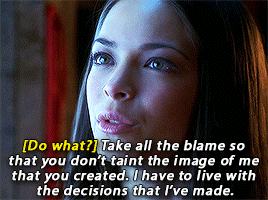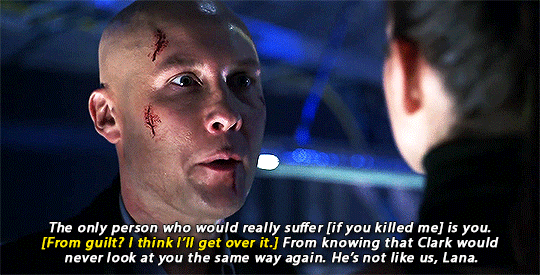#because the lana that clark thought he loved was really just an idealized image that he had projected onto her
Text










— SMALLVILLE, "Accelerate" (2.21) & "Wrath" (7.07)
+ bonus:

#someday I want to make a really comprehensive 'morally grey lana' gifset but god knows I don't have the time for that right now lol#but for now here's this#given this show's piss poor track record with continuity I'm actually shocked that these s2 and s7 scenes complement each other so well#(the 7x07 convo had to be edited down but I kept the most important/relevant bits)#smallville#smallvilleedit#svedit#clark kent#lana lang#lex luthor#clana#dcmultiverse#sv 2x21#sv 7x07#my gifs#lana always knew that she wasn't perfect and she was right to worry about what would happen once clark finally realized it#but he just wouldn't listen to her#and when he finally saw the real dark ruins of her soul... he flinched#because the lana that clark thought he loved was really just an idealized image that he had projected onto her#and that's why their relationship was always doomed to fail#even though they technically stayed together after this (which was a baffling writing choice tbh) they were never the same#also I just need to point out that lex is obviously trying to save his own life in the bonus gif... but he's also RIGHT#lex knows better than anyone what it feels like to topple off the pedestal that clark kent put you on#and I think he really was trying to save lana from the same fate#btw I didn't include his next line but it's 'you might not want to admit it but we understand each other' and that's just... whew#real 'I've seen you in all your fucked up glory and I know that you're just like me' energy#(sorry I'm clearly still thinking about that post that I reblogged last night lmao)
311 notes
·
View notes
Text
Could you comment on Clark typing as ISFP?
Hello! I’ve seen Clark typed as ISFP with such points: “Fi- good inner control of his own emotions, yet you still get the sense he feels deeply, he just doesn’t show the slightest feelings readily like Fe. And no, Fi isn’t ‘selfish’ and Fe ‘for other people’.
They simply refer to where you get your values. Fe - your values are based on global values, basically ‘what most people consider to be right’. Coupled with Si, a past orientated function, he would be looking into the past to see how things were done to base his values on, and looking at the majority rather than what his personal values are.
Fi - personal values. He’d have a deep moral code, which are based on personal ideas instead of global. They likely won’t be shaken from these values, even if other people thought they were wrong, because the individual knows they are right. Due to this, Fi can at times appear ‘different’ to the norms because their values aren’t based on what everyone else thinks but what they believe, whereas with Fe, it is their worst nightmare to stand out and try their best to fit in, however they can.
Se- he does love exercise and sport and want to do it, especially when his powers were taken away, so it has nothing to do with him being ‘super’. Se users are in the present in opposed to in the past, like Si. They want to take action.
What do you think?
Decent assessment of Fi, but it’s not a convincing argument for Clark since there’s no evidence. It’s mostly an abstract discussion about SFP vs. SFJ.
I have gone back and forth on whether Clark Kent of Smallville is ISFP or EFJ, and I will outline why I went with Fe-dom.
He is without a doubt a dominant ‘judging’ personality – everything is filtered through moral judgments, everyone is instantly assessed based on their moral behaviors and values. He clearly has Ni (since his suppositions are often spot on and he also carries a certain amount of idealism) and Se (he often rushes headlong into stopping things from happening and uses his environment to do so, though for him it’s mostly reduced to “break a thing” / smash the bush).
Clark is clearly starved for attention and praise. He wants to be a star and dreams about having others affirm and adore him, which is more of a Fe thing in the sense that he would be emboldened and uplifted by constant positive affirmation rather than made uncomfortable by it. He is also a skilled person in terms of knowing, often, what exactly the right thing to say is, to comfort and console his friends – meaning he can meet them on an emotional level (rather than being separate) and empathize without needing to have experienced a loss to know what it’s like. Whenever his mother asks him what is wrong, Clark confesses easily that he finds it hard to not be honest with his friends, that he wishes he could be with Lana but stays away from her out of respect for another man’s “claim” on her (and her own feelings), and that he finds it hard to stand back and let other people take all the praise for things that he did. (Image type for sure, but that’s an aside.)
Now, as a 2, Clark is all about seeing the best in people – but he also seems to take a while to come around to realizing that Lex isn’t ‘fulfilling’ his greater potential – to me, this seems more like a FeNi or an NF blind spot than the more pragmatic SF approach. I realize that Harry Potter is a different core (9w8 instead of 2, tho I think they are both 269/962) but he tends to have very firm, pragmatic assessments about people and very little idealism, whereas Clark seems to see what Lex COULD be and is trying to mold him toward that, by encouraging him to resist his baser instincts, not be like his father, etc. This is very NF stuff, and particularly ENF – because Fi-doms do not interfere with other people or attempt to change them. (That, by the way, is an indicator for all you NFPs out there who aren’t sure if you are ENFP or INFP. I repeat: Fi-dom is all about me and my autonomy, so they have a built-in sense of “non-interference” that ENF’s lack.)
Clark also scolds his father for his negative assumptions about Lex, because they don’t match the “potential” (idealism) he takes as a matter of course; he even blamed his father, at one point, for pushing Lex toward the darkness, through his rejection of his attempts to be kind. These to me are naive idealistic ENF traits more than grounded ISFP traits. So we’re left with someone with a hero complex, who feels morally responsible to the entire world to take care of it and rushes in to help people indiscriminately (Clark’s Fe vs Harry’s more selective Fi?), who wishes he could be 100% honest with his girlfriend, who gives people the benefit of the doubt by arguing that they all have their reasons for their behavior (extenuating circumstances making “the man”), who has a skill for connecting to almost anyone, who sees the good in people and actively pushes them (moralizes at them) toward it, and who is not present-based so much as dreamy and contemplative about the future.
I fail to see inferior Te, also, in that Clark is never particularly abrasive, blunt, or authoritarian under stress – instead, in a moment of pure horror after an awful discovery, he asks Chloe what would CAUSE (SPOILER) to murder his father, as if he needs a logical explanation to reconcile this incomprehensible evil that makes sense to him. He cannot just conclude that this person is evil and dismiss it, he has to understand WHY (Ti).
This is 100% NOT Fi-dom. To a Fi-dom, bad is bad. Evil is evil. Snape is mean, Snape insults Hermione, Snape is suspicious, ergo Snape is evil -- and it takes a monumental shake-up for Harry to reach any other conclusion about Snape (a fundamental reassessment of Snape being the ‘hero’ and not the ‘villain’).
I think Clark does this:
Without Ni/Se functional development, the EFJ’s self worth is dependent on their social roles, rather than who they are. Unless they get in touch with themselves, they aren’t really sharing themselves with anyone and won’t feel truly appreciated, no matter how much they do for others. The greater their reliance on Fe, the less in touch with their own feelings these types tend to be.
https://funkymbti.wordpress.com/mbti/the-ifp-types/
More than this:
Without Se/Ne development, IFPs judge every situation after their own experience. They can become absorbed in defying “conformity” to social conventions or standards, or can get locked into an eternal present where nothing matters except their own experiences and opinions. Fi is an individual viewpoint; something the IFP brings to reality from within themselves. They need to develop enough functionally to invest in life as it actually is. Otherwise, they spend too much time defending themselves from situations unfriendly to their inner realm, and their beliefs against perceived external threats, rather than taking this as an opportunity to expand their understanding of different people as having unique experiences, and learning not all situations that do not appeal to them are objectively “bad.”
https://funkymbti.wordpress.com/mbti/the-ifp-types/
15 notes
·
View notes